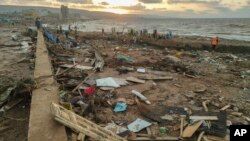Residents of the Benghazi region, one of the areas in Libya's east affected by last week's floods, said they spent "two years" warning authorities that "the big dam already had leaks, even though it was only half full."
Abdelqader al-Omrani, a 48-year-old Benghazi resident who was hospitalized after the floods, said residents warned the municipality and demanded repairs.
Authorities now "have our deaths on their conscience," he added.
Omrani said that when his house, located close to one of the dams, was rapidly submerged late at night, he fled onto the roof terrace, then climbed onto a tree and scrambled up a mountain slope.
He said he later saw the lifeless bodies of six relatives amid the devastation of his hometown.
When the muddy waters finally receded, there were "no buildings, no trees, only the mountain and no living soul," he said, adding, "I experienced the apocalypse, without exaggeration."
Another patient, Ezzedine Miftah, voiced similar anger.
Speaking through his oxygen mask, Miftah said "those in charge did not do their job and let the dams burst."
The anger about the neglect was echoed Monday when protesters rallied in Derna, another flood-wrecked city in Libya's eastern region, and later torched the home of the mayor.
In response, the head of Libya's eastern administration, Osama Hamad dissolved Derna's municipal council.
The disaster has been blamed on the weather conditions that turned Storm Daniel into a hurricane-strength extreme weather event-but also on Libya's years of civil conflict, which damaged infrastructure, early-warning systems and emergency response programs.
The country now is split between two rival governments — the United Nations —recognized government based in Tripoli in the west, and an eastern administration backed by military strongman Khalifa Haftar.

Forum